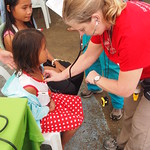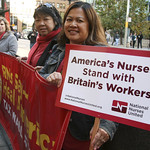As part of the Certificate Program in Women’s Global Health Leadership, we are pleased to announce the Fall 2015 courses Global Women’s Health Movements, Gendered Professions and the Transnational Care Economy, and Health Consequences of Global Trade in Food Commodities, co-sponsored by National Nurses United and Rutgers, The State University of New Jersey. The courses will be offered online during the Fall Semester of 2015. Classes begin September 1, 2015.
Full-tuition scholarships are available for NNU members interested in building global solidarity with those who share RN values of caring, compassion, and community. To apply for a full-tuition scholarship for a course, please submit a short essay (250 to 500 words) describing how the topic of the course will inform your RN patient advocacy. NNU members may apply for a scholarship for more than one course. A separate essay is required for each course for which an RN seeks a scholarship.
All interested scholarship applicants should submit their essay via email to WGHL@nationalnursesunited.org with the subject line “Women’s Global Health Leadership Scholarship” no later than Friday, August 14, at 11:59p.m. Applicants also need to complete and submit this application cover sheet with their essay.
If you have any questions, please contact the Certificate Program Administrative Coordinator, Randi Pace, at (510) 433–2793 or WGHL@nationalnursesunited.org.
This certificate program is of vital importance for nurses as it is the only academic program in the country that honestly assesses the rapidly changing socioeconomic landscape of healthcare in the United States and globally from the standpoint of bedside RNs. Classes prepare nurses to identify and confront social, economic, political, and environmental forces that place their jobs, livelihoods, communities, and planet in jeopardy.
Click here to read more about the certificate program.
Class Descriptions:
Global Women’s Health Movements (01:988:407)
 Global Women’s Health Movements identifies the global institutions and policies that most impact health. Students will discern how women’s non-governmental organizations have attempted to transform existing institutions and policies of global health governance such that people everywhere can lead healthier and more dignified lives. The course encourages students to forge new ground by drawing connections among institutions of global governance and women’s health by examining how women’s organizations around the world have fought to actualize universal access to healthcare.
Global Women’s Health Movements identifies the global institutions and policies that most impact health. Students will discern how women’s non-governmental organizations have attempted to transform existing institutions and policies of global health governance such that people everywhere can lead healthier and more dignified lives. The course encourages students to forge new ground by drawing connections among institutions of global governance and women’s health by examining how women’s organizations around the world have fought to actualize universal access to healthcare.
Health Consequences of Global Trade in Food Commodities (01:988:412)
 Close to one billion people suffer from malnutrition and many more from food deprivation in the 21st century. As neoliberal trade policies have restructured national economies, new speculation in global commodities markets has limited access to food by the poor. This course investigates shifting modes of food production as local practices of subsistence agriculture have been replaced by export agriculture and global commodities markets. The course compares the consequences of these changes for women as consumers in the global North as well as for women as producers of subsistence in the global South. Examining impacts of global commodities markets on food distribution, diet, and health, the course also analyzes the health effects of the creation of consumer markets for processed foods.
Close to one billion people suffer from malnutrition and many more from food deprivation in the 21st century. As neoliberal trade policies have restructured national economies, new speculation in global commodities markets has limited access to food by the poor. This course investigates shifting modes of food production as local practices of subsistence agriculture have been replaced by export agriculture and global commodities markets. The course compares the consequences of these changes for women as consumers in the global North as well as for women as producers of subsistence in the global South. Examining impacts of global commodities markets on food distribution, diet, and health, the course also analyzes the health effects of the creation of consumer markets for processed foods.
Gendered Professions and the Transnational Care Economy (01:988:414)
 Gendered Professions and the Transnational Care Economy examines how nursing and other women-dominated professions lie at the heart of what is known as the “care economy.” Involving work that requires intensive physical labor, person-to-person communication, and spatial proximity, the intimate nature of care work resists mechanization. In contrast to the production of commodities, the highly personalized labor of care is driven by human need rather than profit maximization. Focused on the cultivation and preservation of human capacities, nursing and other professions at the heart of the care economy resist routinization and automation. The course culminates in an exploration of recent efforts to heighten the profit-making potential of the care economy, and it considers the long-term implication of efforts to deskill and outsource care work.
Gendered Professions and the Transnational Care Economy examines how nursing and other women-dominated professions lie at the heart of what is known as the “care economy.” Involving work that requires intensive physical labor, person-to-person communication, and spatial proximity, the intimate nature of care work resists mechanization. In contrast to the production of commodities, the highly personalized labor of care is driven by human need rather than profit maximization. Focused on the cultivation and preservation of human capacities, nursing and other professions at the heart of the care economy resist routinization and automation. The course culminates in an exploration of recent efforts to heighten the profit-making potential of the care economy, and it considers the long-term implication of efforts to deskill and outsource care work.
What are RNs saying about taking courses in the certificate program?
Ashley Fauls, an RN who received a scholarship, shares her valuable experience of taking courses in the certificate program:
“With the Women’s Global Health Leadership Program, NNU has tapped into something strikingly unique [and] beautiful. As a bedside nurse, I have long felt the urge to take advocacy and care into my community, and—if the opportunity arose—to the world at large. However, the task felt so large, so encompassing, and I was at a loss of where to begin. Through the WGHL program, I have had the honor of obtaining solid education as it pertains to health disparities across racial, gender, economic, social, and continental lines. I have felt waves of empowerment through the course educators’ continuous supply of relevant […] reading/viewing material, and stimulating weekly discussions and assignments. My passion for substantive nursing care has been re-kindled, and new passions are emerging on a regular basis. I have been personally and professionally challenged by this learning, and have been astonished by the number of family, friends, and colleagues who are willing, and even eager, to sit, listen, and learn from this essential information. To any nurse considering participation in the WGHL program, I encourage you to surrender to the nudge and jump in!”
Another scholarship recipient, Jeff Breslin, RN, agrees about the value of courses in the certificate program:
“My name is Jeff Breslin, and I am a Registered Nurse in Michigan and an advocate for my patients both inside and outside the hospital. I saw an opportunity through this certificate program to expand my knowledge and therefore my ability to advocate for my patients and my profession. I just finished the first two classes in the seven class series and I have to say they were outstanding. The course content and presentation helped to articulate many of the things that I already have seen in my practice as well as delve into new areas that every nurse/patient advocate should be aware of. I looked forward every week to the rich discussion on the discussion boards. The class was made up of many different people from varying backgrounds, which allowed full exploration of the topics at hand. I found myself not only learning but also helping teach some of the other students who have not had as much exposure to healthcare and women’s health issues. I look forward to the next classes in this program and would recommend these to every nurse. This will help take their advocacy to the next level with very informed, very educated information that will help improve their effectiveness not only at the bedside but also in their role as an advocate.”
Jana Siu, RN, a scholarship recipient, shares her experience of taking classes in the certificate program:
“What is amazing about the Women’s Global Health Leadership courses is that they teach you social structures from a grand scale to the individual level, social structures that perpetuate global injustices and human rights violations. Instead of just knowing that these things happen, we learn the ‘why’s’ and the ‘how’s’. Through that, I was able to truly be awakened and gain insight so that I could see solutions for our community. Seeing solutions is crucial to being engaged while living in a society where we are being driven into apathy with the overwhelming amount of information [with which we are bombarded.] At first I was afraid to take these classes because I will admit that I am not as well-versed as I should be with current events and politics. I feel very different now. As nurses, we are given the opportunities to directly see human suffering through our patients. And yes, the power of touch and empathy are some of our strongest tools, but knowledge is even more so. Because of these classes, I have gained a wider scope of the power of my profession, which has affected the way I practice, the way I live, and the way I vote.”
Get the Class Flyers Below (PDF):
- Global Women’s Health Movements
- Health Consequences of Global Trade in Food Commodities
- Gendered Professions and the Transnational Care Economy


